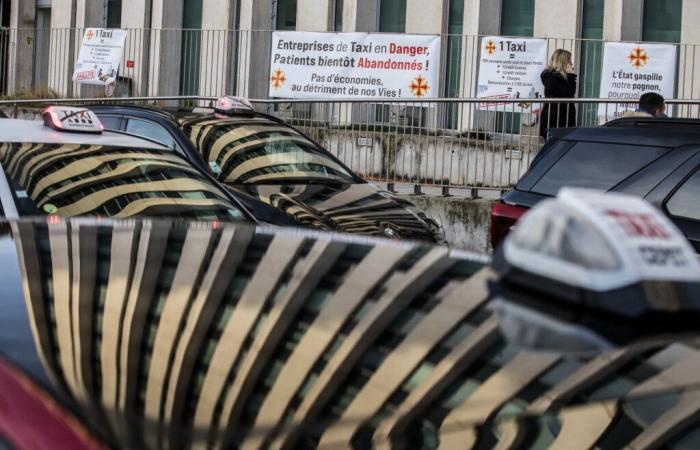Angry health taxis in Paris
Credit : AFP Frédéric Scheiber
Yesterday (Wednesday November 27) in Angers, a snail operation brought together around fifty professionals, and new actions are planned in Finistère and Morbihan in the West. Taxis are affected by price reductions.
The health taxi conflict is getting bogged down. Taxi artisans are in the sights of the National Health Insurance Fund in deficit, and which is launching a savings plan of 300 million euros. The CNAM plans to lower prices from 2025, as part of the new 2025-29 agreement, but for taxis “it’s death foretold”.
First half of 2025, several thousand drivers will already be made redundant.
Samir Attieh chairs the National Federation of Taxi Artisans of Morbihan and Finistère. “We have a prefectural rate for each department that is put in place. Afterwards, when we do medical work, we sign an agreement with the CPAM and we work with a conventional rate, that is to say we agree to discount a little… except that discount after discount after discount, it didn't work anymore… For example, going from Hennebont to the hospital, at the full price, you should be around €25 day rate. If we switch to conventional, we go down to €19 and if we switch to median rate we will be around €15... Above all, this means that during the first half of 2025, several thousand drivers will already be made redundant.”
Credit : Dolores Charles
The 2024 social security financing law has already tightened the conditions for medical transport. It provides that a patient can no longer refuse shared transport, but not everyone can accommodate 8 patients at the same time, estimates Breton Samir Attieh.
“Today, taxis have small volume vehicles with four seats. Before we had large volumes, but after the Covid-19 period, we no longer had the right to take several passengers, so everyone sold these large volumes to take small volumes.
“We all feel the brakes on medical prescription instructions for transport.”
How to take eight people today? This is not possible! And then not everyone has the same immunity in the shared transport car. The prescribing doctor will check off the medical prescription for shared transportation, and he will not look further than that. For two and a half months already, we have all felt the brakes on medical prescription instructions for transport. There are a lot fewer medical transportation prescriptions set out to transport people.”
Finally, according to the National Federation of Artisans Taxi, there can be no compensation because medical represents 80% of the clientele. For “cSome companies even have a 95% figure with medical, underlines Samir Attieh. So if you reduce medical prescriptions, it will quickly become problematic.
“Families pick up travelers from Lorient, not taxis!”
We will take the example of Lorient. The airport is finished, there is nothing left! There is no longer a plane, the Lorient station, trains arrive but people don't really want to come to Lorient if there is not an event, so there are very few travelers who take the Taxi. These are mainly people who leave with their family in the morning, and who return in the evening or on Friday. Families collect them, not taxis!”
In the patient transport sector, expenses recorded an increase “sustained growth between 2022 and 23 (+9%), with a peak at 6.3 billion euros last year, reimbursed by Health Insurance, hence the requested savings”justified the government.






